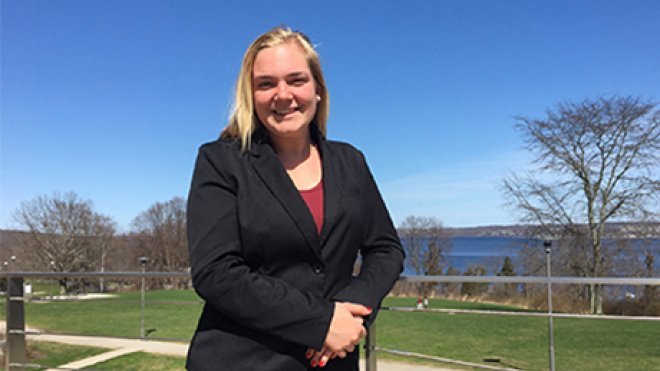For Social Justice Work, Mary Dinnean ’18 Honored as Newman Civic Fellow
Psychology and public health double major recognized for involvement in social justice and public health issues

Editor's note: After graduating on May 19, 2018, with bachelor's degrees in psychology and public health, Mary Dinnean will attend Boston University's master's in public health program.
BRISTOL, R.I. – For her academic and volunteer work to address social justice and public health issues, Mary Dinnean has been honored as a 2017 Newman Civic Fellow, a prestigious award recognizing a select group of student leaders who create lasting change in communities throughout the country and around the globe.
Dinnean is one of 273 students across the nation to receive the honor from Campus Compact, a national coalition of college and university presidents who support and promote public service in higher education. She is the second student from Roger Williams University to be named a Newman Civic Fellow, joining Ashley Barton ’15 in earning the illustrious award.
A junior double-major in psychology and public health, Dinnean is being recognized for her social justice work via academic studies and leadership positions in student organizations.
“As someone who is about to emerge from college into the world, I’m excited about what my generation will collectively be able to accomplish,” she said. “This honor is a validating experience to know that social change is possible, that I have a powerful enough voice in society to create change, and that through the connections of this nationwide network of student leaders, my ideas can be put into action to help change the world for the better.”
During a study-abroad psychology course in Jamaica, she worked with global service-learning organization Amizade to provide educational support for elementary students with learning disabilities – an experience which is informing her research on the intersection of education and public health issues.
As a student leader in the Food Recovery Network, which collects the daily leftovers from RWU’s dining halls and brings it to local women’s shelters, she helps close the equity gap for those who lack access to food while keeping perfectly good food out of landfills. And as a peer educator with the on-campus Health and Wellness Educators (HAWEs), she counsels fellow students on sexual health and violence prevention.
RWU President Donald J. Farish nominated Dinnean for the award, noting in his letter to Campus Compact that she “has actively addressed issues of social justice and public health since her first year at RWU.”
Dinnean has never lacked for inspirational role models. The New Hartford, Conn., native cites her foremost mentor as her mother, a Navy nurse who worked at the forefront of the HIV and AIDS epidemic in Los Angeles in the 1980s. “She is my source of inspiration. At the outset of the epidemic, many of her colleagues refused to treat men with HIV and AIDS, sometimes based on homophobia but also fear, because society didn’t know anything about the disease and how it was transmitted.”
At RWU, Dinnean credits Professor Kerri Warren and Professor Erin Tooley for informing and inspiring her career goals. “Both are incredible women who have made immense changes in their fields, and I wouldn’t be where I am today without them scaffolding me along.”
With a minor in gender and sexuality studies and a self-ascribed LGBTQ ally, Dinnean also notes the impact Professor Laura D’Amore has had on her as an “active, tireless advocate for marginalized communities.”
As a Newman Civic Fellow, she gains multiple opportunities to network with her fellow student leaders at national, regional and state gatherings, access to professional development and a minimum $1,000 scholarship. On campus and locally, she’ll act as a mentor for creating social change; and she’ll continue her work with the Food Recovery Network as next year’s co-president as well as with the HAWEs.
At RWU, we develop Civic Scholars who believe in community-engaged work. That’s why we commit to providing every student an opportunity that empowers them to put their knowledge and skills to the test solving real-world problems and creating meaningful change with community partners. Learn more about the Civic Scholars program and how to help us reach our goal of every student participating in civic scholarship.